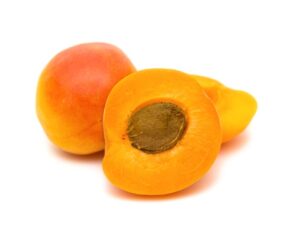All About the Tomcot: Flavor, Benefits, and How to Pick the Best
- By FruitGuys Staff
- Reading Time: 3 mins.

As alike as they sound, Tomcots aren’t related to tomcats—they’re actually a tasty fruit! The Tomcot apricot is a large, soft apricot variety with a bright orange color and a classic apricot taste. Biting into a ripe Tomcot on a sunny day is like inhaling summer: juicy and sweet, with just a hint of bite.
The History of Tomcots
Tomcots burst onto the stone fruit scene in 1989, but they date back nearly two decades farther. In 1970, Dr. Thomas Toyama developed the variety at Washington State University by crossing Rival and Goldrich apricots. He selected it as a favorite in 1974.
According to the Improving Northwest Nurseries Institute (INNI), the Tomcot almost didn’t make it to market. When Dr. Toyama retired from Washington State University’s breeding program in 1985, the university closed the program and his work was nearly lost. Luckily, INNI stepped in and saved Dr. Toyama’s creations, eventually bringing the Tomcot to market in 1989.
Today, Tomcots are celebrated for their quality and favored by fruit enthusiasts and growers alike.
The Nutritional Profile of Tomcots
Tomcots, like other apricots, are rich in vitamins A and C, which are essential for maintaining healthy eyes and skin. They also contain fiber, which supports digestive health. All in all, they’re a healthy, low-calorie snack.
According to the United States Department of Agriculture (USDA), a fresh apricot contains:
Energy – 16.8 calories
Protein – 0.49 gram
Carbohydrates – 3.88 grams
Fiber – 0.7 grams
Sugar – 3.23 grams
The Culinary Uses of Tomcots
Tomcots are highly valued for their culinary versatility. Enjoy them fresh as a quick snack, add their sweet and tangy slices to your salads, or turn them into jams or sauces to spread on toast or a meaty main course. If you’re lucky enough to have a boatload of Tomcots, try freezing or canning them for later. Neither of those options will impact the fruit’s nutritional value.
The Health Benefits of Tomcots
Like other apricots, Tomcots are packed with health benefits that make them a great addition to your diet. Here are just a few things that eating apricots can do for you.
Boost Your Nutrition
Apricots are low in calories and rich in essential nutrients. They offer vitamins A, C, E, and potassium and are an excellent source of fiber.
Fight Free Radicals
Apricots are loaded with antioxidants like beta carotene, lutein, and zeaxanthin, which combat free radicals. Eating them regularly can help protect you from chronic diseases and inflammation.
Enhance Your Eye Health
The vitamins and antioxidants in apricots can enhance your eye health, reducing your risk of night blindness and age-related eye diseases.
Save Your Skin
The nutrients in apricots may help protect your skin from UV damage and environmental pollutants. Vitamins C and E, in particular, can help prevent wrinkles and promote collagen production.
Support Your Gut Health
Apricots are high in both soluble and insoluble fiber. That means they can help with your digestion, support your gut microbiome, and may even reduce your risk of obesity.
Help You Hydrate
Like most fruits, apricots are full of water—which means they can help you stay hydrated! That’s crucial for blood pressure, joint health, and more.
Tips for Selecting Ripe Tomcots
To choose the best Tomcots, look for fruits with blushing orange skin. A ripe Tomcot should also give off a sweet, strong aroma that temps before you taste it. The texture is a giveaway, too; the fruit should be firm but slightly soft.
To experience the delight of perfectly ripe stone fruits like Tomcots delivered straight to your door in season, check out The FruitGuys’s seasonal fruit boxes.
FAQs
- Can I freeze Tomcots for later use?
Yes, you can freeze Tomcots. Wash, pit, and slice them, then spread them on a baking sheet and pop them into the freezer. Once the slices are frozen, transfer them into airtight containers or freezer bags.
- Are Tomcots organic?
You can find both conventional and organic Tomcots for sale. To make sure you’re buying organic ones, check the label, ask your grocer, or choose organic fruit box delivery for your office.
- Can I eat Tomcots with the skin on?
Absolutely! Tomcots are meant to be eaten with their skin. It’s rich in nutrients and fiber.


